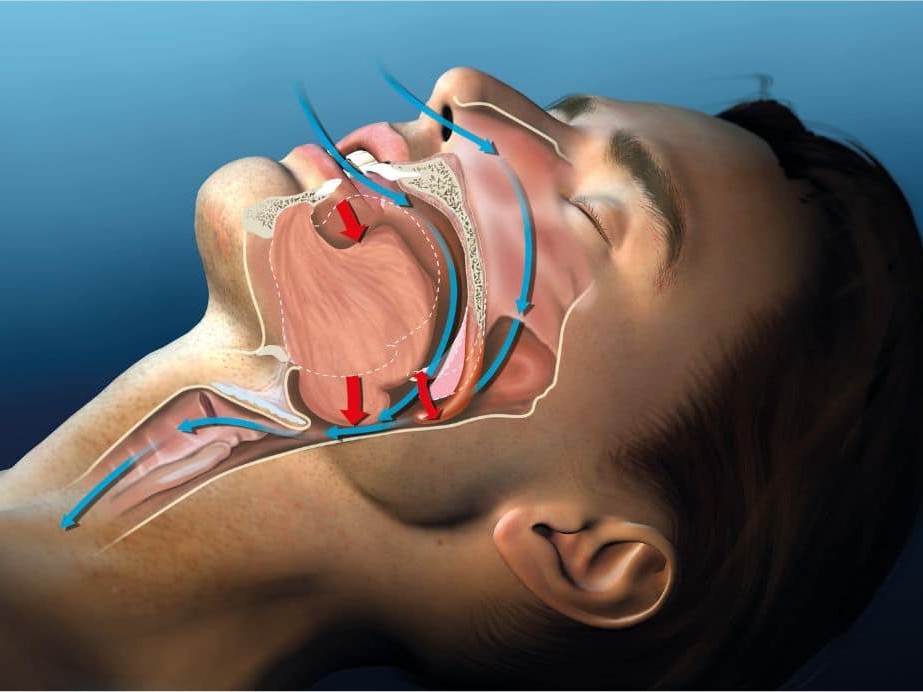Signs and Symptoms of Sleep Apnea
A large number of people suffer from sleep apnea without realizing it. Recognizing the symptoms early can help prevent complications and improve quality of life. Common signs include:
- Loud snoring, gasping, or choking sounds during sleep.
- Daytime fatigue, difficulty concentrating, and brain fog.
- Frequent waking throughout the night or restless sleep.
- Morning headaches and dry mouth upon waking.
- Jaw pain, teeth grinding (bruxism), or symptoms of TMJ disorder.
If left untreated, sleep apnea can lead to serious health concerns, including cardiovascular disease, obesity, diabetes, and mood disorders. Seeking professional evaluation and treatment is essential for long-term health improvement.
How Airway Orthodontic Treatment Helps Sleep Apnea
Traditional sleep apnea treatments, such as CPAP machines, are effective for managing symptoms but do not address the underlying cause of airway obstruction. Airway-focused orthodontic treatments offer a long-term solution by improving jaw alignment, expanding the airway, and promoting nasal breathing.
Addressing the Root Cause of Airway Obstruction
One of the primary factors contributing to sleep apnea is a restricted airway. Jaw structure, tongue posture, and nasal breathing all play a role in determining how well air flows during sleep. By using orthodontic treatments to reposition the jaw and enhance airway space, patients experience a natural improvement in their breathing patterns.
Airway-focused treatments include skeletal expansion, myofunctional therapy, and oral appliance therapy. These approaches work together to create more space in the airway, reducing the risk of collapse during sleep and improving oxygen intake.
Non-Invasive Orthodontic Treatments for Sleep Apnea
Unlike surgical interventions, airway orthodontic treatments are non-invasive and provide lasting results. Treatment options include:
Oral appliance therapy, which repositions the jaw forward to prevent airway obstruction.
Skeletal expansion treatments, designed to create more room in the upper jaw and improve airflow.
Myofunctional therapy, a program that strengthens airway-supporting muscles and promotes nasal breathing.
Implementing these treatments can significantly reduce patients’ sleep apnea symptoms without relying on cumbersome CPAP machines or invasive surgeries.
Benefits of Airway-Focused Sleep Apnea Treatment
Patients who undergo airway-focused sleep apnea treatment often experience noticeable improvements in their sleep quality, energy levels, and overall health. Some key benefits include:
Better Sleep Quality and Deeper Rest
A well-functioning airway allows for uninterrupted sleep, reducing nighttime awakenings and enhancing overall restfulness. Patients report feeling more refreshed in the morning and experiencing fewer disruptions throughout the night.
Reduced Snoring and Nighttime Breathing Issues
Snoring is often a symptom of restricted airflow. By improving airway health, patients notice a significant reduction in snoring, allowing both them and their partners to sleep more soundly.
Decreased Risk of Long-Term Health Problems
Sleep apnea has been linked to heart disease, stroke, and other serious conditions. Treating the root cause of airway obstruction reduces these risks and supports long-term wellness.
Improved Energy, Concentration, and Daily Function
Individuals with untreated sleep apnea often struggle with daytime fatigue, mood swings, and memory issues. By enhancing airway health, patients experience greater focus, higher energy levels, and improved cognitive function.




